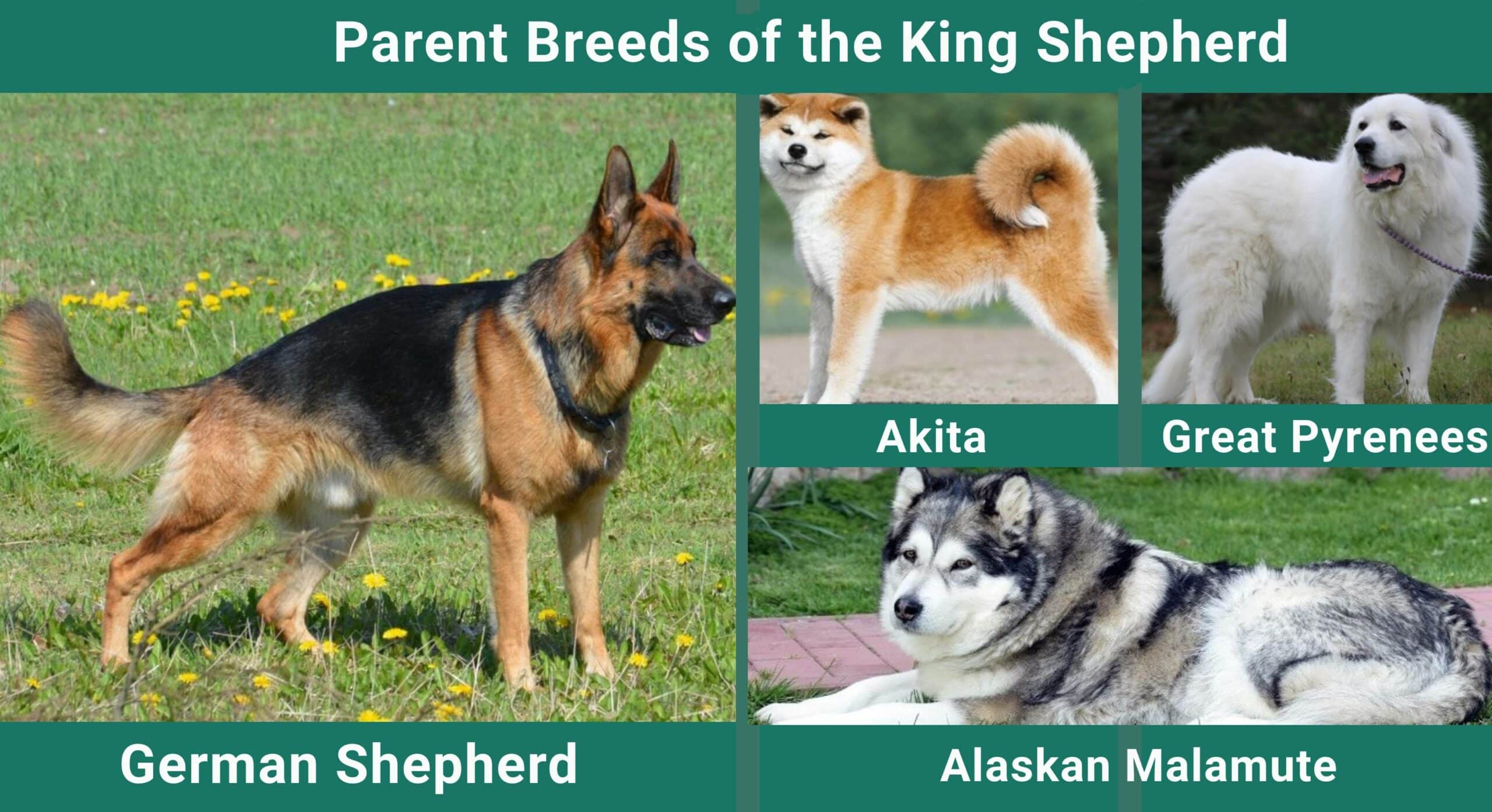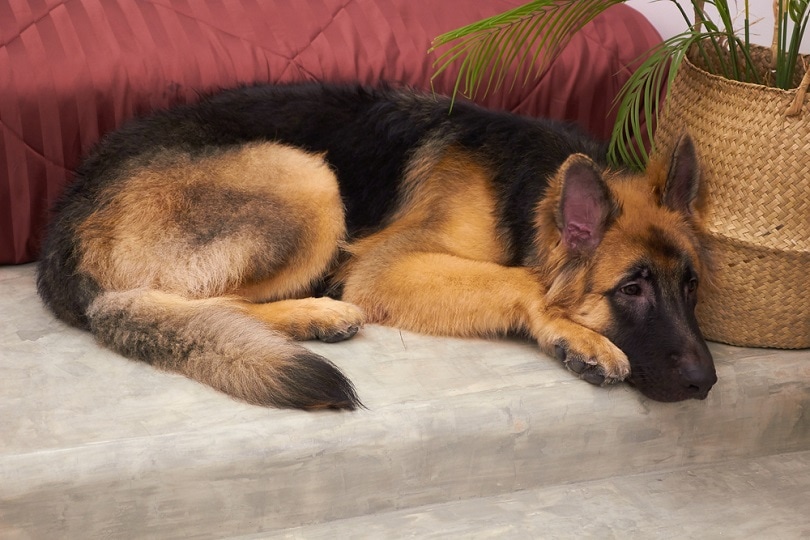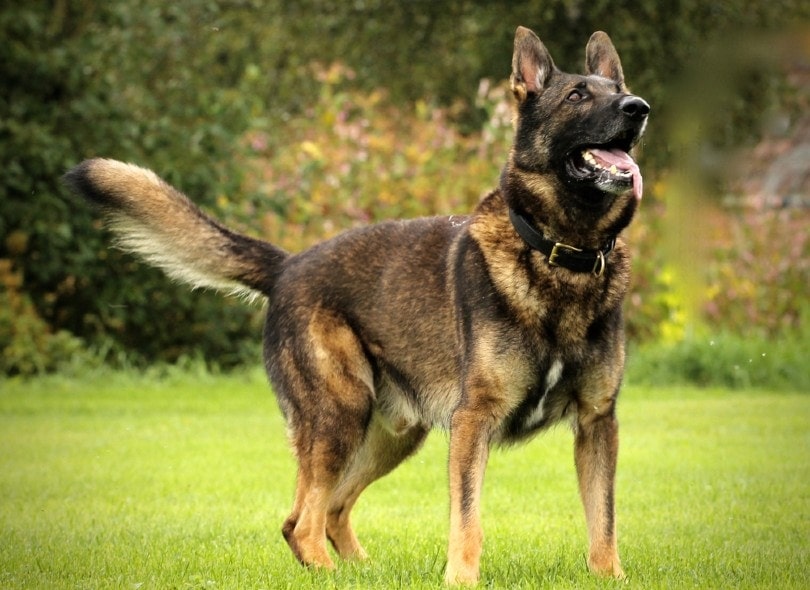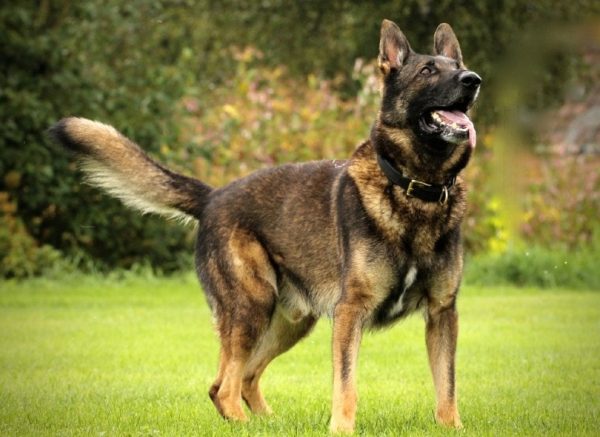Click Below to Skip Ahead
German Shepherds are wonderful dogs — there’s a reason that they’re almost always one of the top five most popular breeds in America. However, they’re not without their flaws — most notably, a tendency to suffer from health issues later in life.
The King Shepherd is the designer breed that was intended to solve those problems, creating a dog every bit as good as a German Shepherd, but with far fewer health issues.
Breed Overview
Height:
25 – 31 inches
Weight:
70 – 150 pounds
Lifespan:
10 – 12 years
Colors:
White, silver, tan, brown, gray, black
Suitable for:
Active families, those looking for a healthier German Shepherd
Temperament:
Loyal and loving, intelligent, easy to train, friendly, high-maintenance, clingy
There’s not a set recipe for making a King Shepherd, other than that German Shepherd DNA must be involved. These animals can be mixed with Alaskan Malamutes, Great Pyrenees, and even Akitas, so you never really know what you’re going to get with a King Shepherd, other than that they will make a pretty fantastic pet.
King Shepherd Puppies
King Shepherd puppies can vary in temperament and appearance depending on what exactly they’re mixed with, but for the most part, they tend to behave like German Shepherd puppies. That means you need to be ready to have a little ball of fluff bouncing off the walls of your home, chewing on anything that they can find and just generally being a holy terror whose only redeeming quality is the fact that they’re impossibly adorable.
The good news is that these dogs are eager to learn anything that you’re willing to teach them, so you shouldn’t wait to start obedience training and socialization. The sooner that you lay the groundwork for a well-mannered dog, the better-behaved the animal will be later in life.
Don’t push them too hard athletically, though. These are big dogs, and their joints develop slowly, so you should wait until they’re at least a year and a half old before you ask them to do any high-impact activities.

Temperament & Intelligence of the King Shepherd
The King Shepherd is renowned for their even and loving disposition. These are genial, easygoing dogs, and they love nothing more than to cuddle up next to you and soak up all the affection that you can offer.
That doesn’t mean they can’t be imposing when the time calls for it, however. It’s just hard to convince them that the time to be imposing has begun.
When they need to be, these dogs are basically fearless. They’ll step in the path of danger to protect their families without giving it a second thought, and these are strong dogs, so there aren’t many dangers out there more imposing than they are.
They’re incredibly smart too. German Shepherds are popular in large part because of how easy they are to train, and King Shepherds are just as malleable. They love to learn, and will happily spend as much time as you like mastering new commands.
That intelligence can work against you, though. If you don’t train them or give them enough stimulation, they’ll make their own entertainment, and that can include chewing up your furniture, eating everything within paw’s reach in the kitchen, or figuring out a way to escape from a fenced backyard.
Are These Dogs Good for Families?
King Shepherds are one of the best family dogs that you could ever hope to bring home. They’re patient and loving, so they can tolerate clumsy little kids. Still, these are big dogs that are capable of doing damage if provoked, so you should never leave little ones unattended with them. While the threat of violence is low, these pups can still hurt your kids quite accidentally. They’re boisterous and energetic, and small children can easily get mowed down by a King Shepherd racing around the yard at top speed.
Older kids will love them, as they make wonderful playmates and can provide a shoulder to cry on when life gets rough.
They’ll be dedicated protectors of their new family, and no one’s likely to mess with the kid who has a King Shepherd at their beck and call. While these dogs are not prone to violence, they can definitely give off the impression that they are, and one bark from this dog is likely all it will take to send a would-be home intruder running the other way.
You may well need to enlist your entire family in tuckering them out, however, as they have seemingly boundless energy. Expect everyone to get involved with raising the dog, whether that means hour-long walks or just spending a great deal of time throwing a tennis ball in the backyard.

Does This Breed Get Along With Other Pets?
One issue that German Shepherds often have is aggression toward other animals. This is understandable because they were bred to protect livestock — any other animal, including another dog, is a potential threat to their herd.
King Shepherds were bred to eliminate this issue. These dogs love to play with other pooches, and it may take another dog to fully tucker out a King Shepherd. They’ll happily romp around the yard with dogs of any size, and they can be surprisingly gentle and accommodating with smaller playmates.
Don’t just assume that your King Shepherd will like other dogs from the get-go, however. You should socialize them as soon as you bring them home, and that includes introducing them to other dogs, cats, and other animals as soon as possible.
They can also be welcoming to cats and other small pets, although it’s always better if they’ve been raised with them. However, they don’t have a super-high prey drive, so there’s a good chance that they’ll leave the cat alone.
Another possibility is that they’ll see your cat as a potential playmate. While this sounds good in theory, it may not end well for the cat because these dogs can seriously injure them by stepping on them, sitting on them, or simply playing too rough. Try to teach your pup to leave the other pets alone entirely.
Things to Know When Owning a King Shepherd
King Shepherds are rare enough that many people have never encountered one, let alone owned one. Fortunately, raising one of these dogs isn’t all that different from raising any other puppy, but just to be safe, we put together a brief guide to King Shepherd ownership here.
Food & Diet Requirements
These are big, active dogs, with an appetite to match.
Your King Shepherd will need a large amount of food, so plan to budget a healthy amount for that (don’t be surprised if they go through a bag or more per month). They eat more as puppies than they do as adults, and you can likely whittle down their diet even more once they become senior dogs.
Don’t let them eat as much as they want, though. Obesity is terrible for these dogs, so make sure to practice strict portion control and never let them free-feed. You should also avoid giving them too many treats or scraps.
The quality of the food is just as important as the quantity. Look for a food that has real meat as the first ingredient, and avoid things like corn, wheat, soy, and animal by-products because these are full of cheap calories. Ideally, you want a food that’s high in protein (over 30%), with a healthy amount of fat (15%) and fiber (5%).
Unfortunately, food that checks all those boxes will probably be more expensive than the stuff that you can find at your local big-box store. However, you probably spent a bundle buying your King Shepherd in the first place, so there’s no reason to skimp on something that will make such a difference in their long-term health.
Exercise
Exercise isn’t optional with the King Shepherd. These dogs need plenty of physical stimulation, and they aren’t shy about demanding it.
Plan on spending at least an hour a day trying to tucker them out. That could mean a brisk walk around the neighborhood, playing fetch in the backyard, or working on their obedience training.
Don’t try to exhaust only their muscles. Their brains need just as much work. Obedience work is great for this, along with agility training, puzzle toys, or games like hide-and-seek.
While you can own a King Shepherd regardless of where you live, people with houses that have big backyards will be at an advantage. If you live in an apartment, you can still give them all the exercise that they need, but you’ll have to be more creative. It helps if you live near a big park.
There’s no limit to the kinds of exercise that you can convince a King Shepherd to do. They’ll do anything that lets them run, jump, and act goofy, and it’s even better if they can do all those things while being around you.
Training
Training and socialization are essential for these dogs. They’re not known for having aggressive temperaments, but when you have a dog that can weigh over 120 pounds, there’s no sense taking any chances.
The work should begin as soon as you bring the dog home. You should teach them all the basic commands — sit, stay, leave it, etc. — and work on reinforcing them all the time. Once they have the basics down, you can teach them more complex tricks, and the sky’s the limit as to what these pups can learn.
One of the most important things that you can teach a King Shepherd is how to walk on a leash. They’re so boisterous and happy that they can barely contain their excitement when it’s time to go sniffing, but they’re also incredibly strong. If you don’t want to get dragged up and down the street, you’ll need to train them on how to behave when the leash comes out.
Socialization is equally important. Try to take your new puppy to as many places as you can — to the store, on walks, and even to visit friends and family. The more places that they’re exposed to, the more comfortable they’ll be in new situations, which reduces the likelihood that they’ll get nervous and resort to violence.
These dogs are eager to learn, and that makes them one of the easiest breeds to train. If you don’t feel up to it, though, don’t hesitate to enlist the services of a professional. It doesn’t matter who trains them, just so long as it gets done.
Grooming ✂️
This is one issue with German Shepherds that the King Shepherd fails to address. If anything, these dogs could be even bigger shedders than their more famous counterparts.
If you don’t want to live in a sea of dog hair, you’ll need to brush them regularly. Three times a week is likely the absolute minimum, and you should aim to do it daily. The longer you wait, the harder the job will be, and the higher the likelihood that you’ll have to deal with mats or tangles.
The shedding gets especially bad during seasonal changes, so watch the calendar and tailor your grooming efforts accordingly. The good news is that you only need to bathe them when they get visibly dirty, so that should save you time and grief.
Beyond that, you’ll need to keep their ears clean as best you can. That means taking a damp cloth and wiping them out at least once a week and being sure to dry them thoroughly whenever they get wet.
They’ll need their teeth brushed daily and their nails trimmed whenever they get too long, but other than the shedding, there’s not much to worry about with these dogs.
Health and Conditions
The King Shepherd was bred to fix a few issues with the German Shepherd, most notably their health problems. The results are something of a mixed bag, however.
There’s no denying that King Shepherds are generally healthier dogs than German Shepherds. That doesn’t mean they don’t have health issues of their own to deal with, however, and they may be less healthy than some other breeds.
Any dog this size is going to be vulnerable to issues like bloat and hip dysplasia. It’s an inescapable fact that large dogs put more stress on their bones and joints, so that’s just something that you’ll have to deal with if you want a bigger companion by your side.
- Allergies
- Hypothyroidism
- Degenerative myelopathy
- Bloat
- Hip and joint dysplasia
- Von Willebrand’s disease
Male vs. Female
The breed is too young for there to be any clear distinctions between males and females, and the results would likely be skewed by the breeds mixed in with the German Shepherd DNA, anyway.
However, one thing we can tell you is that males are almost always bigger than females, sometimes by a large amount. That doesn’t mean that girl King Shepherds are small, though — it just means that some males can be truly massive.

3 Little-Known Facts About the King Shepherd
1. These Dogs Are Famous for Their Temperament
While German Shepherds are friendly, loyal, and loving, they can have an aggressive streak, which is why it’s so important to socialize and train them from day one.
King Shepherds, on the other hand, were bred to address the German Shepherd’s flaws, and that includes their aggressive streak. Kings are incredibly loving and patient, and they can make the perfect family pet.
Their massive size still makes them formidable guard dogs, but any bad guy that breaks into your house is likely going to be guilt-tripped into providing belly rubs rather than running for their life.
2. They’re Notoriously Clingy
A giant dog like the King Shepherd can understandably strike fear into the hearts of just about everyone, so who would’ve guessed that their number-one fear is you walking out the door?
The dogs bond intensely with their owners, and they enjoy being near you at all times. They also don’t understand why you would ever want to leave their side (and who could blame them for that?).
As a result, you’ll need to work hard on curbing their separation anxiety. If you don’t, they could take all that nervous energy out on your furniture — and you don’t want to see what kind of damage a 100-plus-pound dog can do.
3. They’re Chameleons
King Shepherds tend to be a bit more colorful than German Shepherds, and their coats will even change color several times throughout their lives, especially while they’re puppies.
In fact, when picking out a King Shepherd puppy, it’s best not to get too attached to their coat color — it’s likely to change. The adult dog that you end up with could look drastically different from the puppy that you picked out!
Final Thoughts
While the King Shepherd may not have a uniform genetic background, they can be fantastic dogs, regardless of what breeds they have in their DNA. They’re big, loving, and easy to train, and while they’re quite intimidating, they’re not prone to aggression or violence.
The only real downsides to the breed are the difficulty that you’ll encounter procuring one, as well as their tendency to experience separation anxiety and their relatively short lifespans. If you can look past those things, they might just be the perfect dog.
In fact, as more people are exposed to these animals, we wouldn’t be surprised if they overtook the German Shepherd in popularity. That’s not a dig at the German Shepherd — it’s just a testament to how amazing King Shepherds can be.
We guess that it’s true what they say: It’s good to be the king.
Featured Image Credit: LNbjors, Shutterstock







